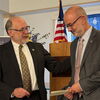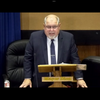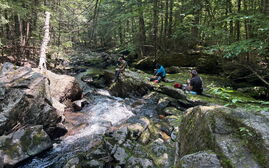Bill would create first step toward Maine spaceport, and beyond
 Courtesy / bluShift Aerospace
A bill has been introduced in the Legislature that would form a group to look at Maine's future in the space industry. The move is supported by businesses like bluShift Aerospace, in Brunswick, which makes launchers for nanosatellites like the one pictured.
Courtesy / bluShift Aerospace
A bill has been introduced in the Legislature that would form a group to look at Maine's future in the space industry. The move is supported by businesses like bluShift Aerospace, in Brunswick, which makes launchers for nanosatellites like the one pictured.
A bill that would create a leadership council aimed at locating a spaceport in Maine as well as promoting "new space" — the emerging private spaceflight industry — is being introduced today with some fanfare before going to its first public hearing.
LD 2092 would create a public-private partnership of commercial nanosatellite and aerospace interests, as well as local, state, federal government and academic leaders, to look into developing a spaceport site. The site would include a space data and analytics center, a new space innovation hub and launch sites. It would also have services for increasing the state's participation in the emerging new space global market, including nanosatellite and aerospace technology.
The council would present a strategic plan to Gov. Janet Mills and the Legislature by Dec. 31, 2021.
The bill is sponsored by state Sen. Shenna Bellows, D-Manchester, who is holding a press conference in the State House Hall of Flags early this afternoon before the bill goes to a 1 p.m. public hearing before the Innovation, Development, Economic Advancement and Business Committee. Joining Bellows will be Rep. Mattie Daughtry, D-Brunswick, as well as officials from the state's aerospace industry.
The bill is supported by the Maine Space Grant Consortium, as well as bluShift Aerospace, based in Brunswick, and VALT Enterprises, based in Sanford, according to a news releases announcing the news conference.
The news comes as the new space industry is already taking off in Maine.
Last June, bluShift, which designs a new launch system for nanosatellites, won a $125,000 grant from NASA to develop its product. A bluShift launcher will be on display at the State House today.
The Maine Space Grant Consortium is also considering the Brunswick Landing campus as mission control for a program that would launch cubesats — small satellites — from Commerce Park in Presque Isle, the former Loring Air Force Base. The consortium is conducting a study, funded by the Maine Technology Institute and NASA, on the market feasibility of the program.
"Maine is uniquely positioned to be on the forefront of this exciting, emerging industry," Bellows said in a news release. "Any time we have the opportunity to welcome and make way for new businesses that bring high-paying jobs to our state, that’s an opportunity we ought to pursue."
“Between our geographic location and existing military infrastructure at former bases, our state stands a real chance to become a hub for a multi-billion dollar industry," she said. "What may have seemed like science fiction just a few years ago is not only possible, it’s happening now. There is no reason why Maine shouldn’t be leading the way.”
What's in the bill?
As defined in the bill, the "new space innovation hub and launch sites" would support mission control for managing satellite flights from the point of launch until the end of the satellite mission; a hub for new business incubation and acceleration; a new space industry meeting place; a research and development center for industrial, academic and scientific inquiry; a space for satellite fabrication and integration; and a learning center for children from kindergarten to grade 12.
The leadership council's makeup would be:
- Two members of the Senate, including a member from each of the two parties that have the most members, appointed by the Senate president;
- Two members of the House of Representatives, including a member from each of the two parties that have the most members, appointed by the speaker;
- Two members of the public appointed by the Senate president, including a representative of an in-state manufacturing business with 25 or more employees that is involved in the aerospace industry, and a representative of a private in-state foundation;
- Two members of the public appointed by the speaker of the House including a representative of an in-state manufacturing business with fewer than 25 employees that is involved in the aerospace industry and a representative of a college or university in the state with expertise in aerospace;
- Two members of the public appointed by Mills, including a representative of an entity directly funded by the National Space Grant College and Fellowship Program and a representative of an in-state nonprofit research organization that uses satellite-based data.
The appointments would be made within 30 days of the effective date of the resolve and the first meeting would be set for shortly after that.
The council would create a strategic plan for a spaceport complex that would include goals and targets that align with the state's economic plan and a review of the current aerospace industry and a gap analysis. It would also identify a spaceport complex location with appropriate launch sites that can secure U.S. Department of Transportation and Federal Aviation Administration approval.
The report would also have a strategy to achieve goals, and financial analysis, including the costs of building a spaceport and funding sources.
This is the short emergency session of the Legislature, and business wraps up April 15, so the bill would either be acted on before that date or passed to the 130th Legislature when it convenes later this year.














0 Comments